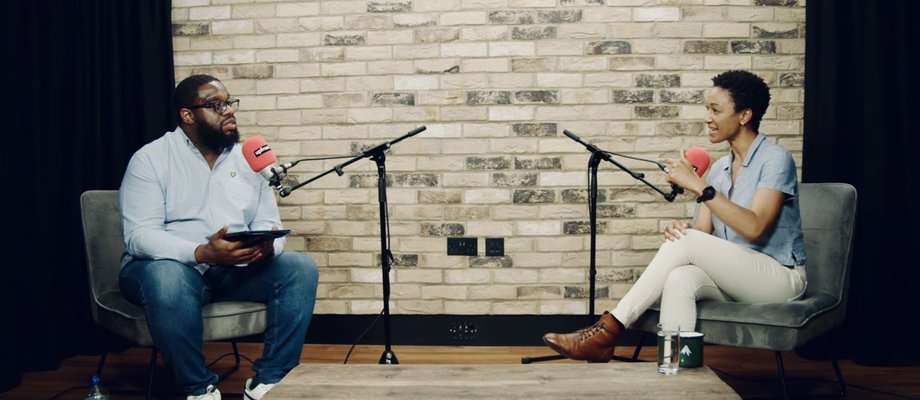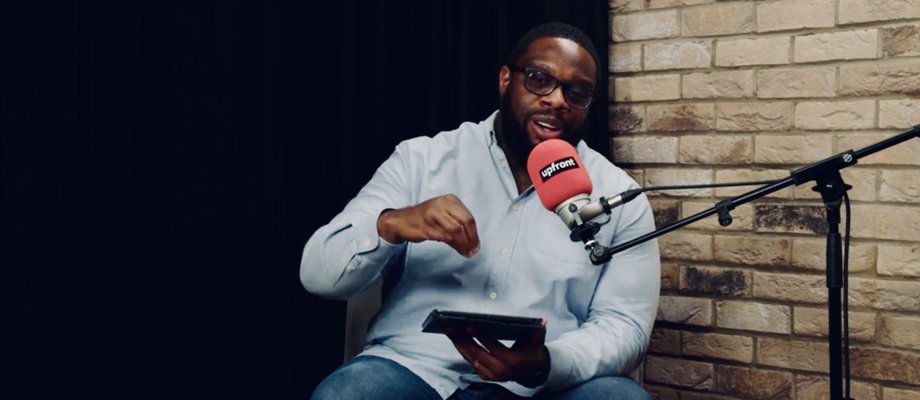In the fifth episode of the new series of the Upfront podcast, financial adviser Emmanuel Asuquo talks to behavioural finance expert Krystle McGilvery about how financial services can better support and serve neurodivergent customers.
Here are some highlights from that conversation. Listen to the episode in full here.
Emmanuel: I'll get straight into it. Are financial services doing enough to help neurodiverse people?
Krystle: Straight-in, punchy question, big question, and I think an important question. They can do so much more. So, if we take a step back and understand what neurodivergence is, it's so varied. So even if financial services make a massive step to do loads of stuff, there's going to be constant work to do. Making people feel safe, comfortable, confident, and that requires empathy and patience and a look at the whole process. It's a big job.
Emmanuel: What is neurodiversity? How could you define it for people at home?

Krystle: To keep it simple, we're talking about differences in our cognitive ability and functioning. All our brains are made so unique and beautiful and that manifests in terms of how we think, feel, and act. Which then, given that we're talking about money here, impacts our finances. So when you think of neurodivergence, you're thinking of things such as ADHD, autism, Tourette's, dyspraxia. All those things are all about the brain and how the brain is different.
Emmanuel: I've known you for quite a while, but I've never actually learned about your journey. So tell me, how have you battled with this, and how has it affected you along the way?

Krystle: I struggled a lot at uni and actually with my maths. So I had to retake the final year. I passed it very well, but that was hard. Then I fell into working as an accountant. And again, in the workplace, I just felt really different to everybody else and I couldn't quite articulate why. To cut a long story short, 15 years later, I started to question what was going on. Studying behavioural economic science, which is the psychology of decision-making, is where I was diagnosed as being dyslexic and having ADHD.
A lot of my clients call me really upset after speaking to their accountant or bank because of how they spoke to them about their financial situation, they're much more sensitive.
Behavioural Finance Expert
Emmanuel: How can neurodiversity affect people's financial habits?
Krystle: So if we look at neurodivergence, ADHD, impulsivity, forgetfulness, struggling with future planning, setting goals and sticking to those plans, that can have a really detrimental impact or effect on your finances. There are also things such as emotional dysregulation. A lot of my clients call me really upset after speaking to an accountant or calling their bank because of how they spoke to them about their financial situation. And because they're much more sensitive, they break down. They have a whole full nervous system reaction. There are other things called shutdowns and meltdowns where you literally disconnect from the world, and if you've got financial decisions to make or a bill to pay because you're not mentally in that space, then you can't do that. Again, it can really have a negative impact on your finances. I know Monzo did an amazing study, saying the ADHD tax is £1,600, and the ADHD community were laughing because they're like, it's so much more than that! Think of a simple example, you know, having a subscription to something because you've forgotten to cancel it. Buying groceries and because you've forgotten you've got it in the fridge, it goes mouldy there are so many areas where it can really play up.

Emmanuel: Now, I was surprised to see a stat that says around 20 percent of the population are neurodiverse. Do you think financial services take that serious enough?
Krystle: The stat is good. It's possibly much higher than that. When we're talking about someone being blind, we can quite easily see the impact that's having right away when they walk in the room. With a cognitive difference, well you can't see it, can you? Making it a number one area to pay attention to becomes a challenge in itself, but it needs to be focused on because people are suffering.
I was surprised to see a stat that says 20% of the population are neurodiverse. Do financial services take that seriously enough?
Host
Emmanuel: We've seen reports that say investment firms and financial advisers are underserving neurodiverse people and that those customers may be left in worse financial health as a result. How do you feel about that?
Krystle: I can see how that's true. And I guess that leads us to the importance of the financial adviser learning about this and how they can best support them.

Emmanuel: Yeah, definitely. I think it's something that we all got to take away and think about. Now, in my head, I'm thinking about how do I do my part? So, what do you think the financial industry should be doing to better cater for neurodiversity? What aren't they doing now?
Krystle: I think everybody needs to go and learn and understand what it means and how it shows up. Then, along with that training, it's being equipped with the tools and solutions that are going to help them go on their financial journey. Understand how your client wants to communicate. Some don't like emails at all. Giving the client a clear outline of what to expect and what that journey is going to be like for the next however long you're working with them is a game changer because they don't want the element of surprise. There are some who love a graph and data - an autistic client might be like, yes!, I love this stuff but then others who hate it. So at the start of your journey together it's asking those specific questions how do you best like to communicate how should i share this information with you yeah and tailoring that for them.
There is a narrative among certain people that financial services are not out for them and this is a great opportunity to turn that on its head.
Behavioural finance expert
Emmanuel: I've really enjoyed our conversation today. Finally, this is your platform. What do you want to say to our listeners, people who work in financial services?
Krystle: There is a narrative among certain people that financial services are not out for them, and I think this is a great opportunity to really turn that on its head quite easily by committing to the cause and even open up the door to say, we are open to learning how to be better. That in itself is huge. And then go about the journey of learning, right? Get your training. Bring in financial experts in the neurodiverse space, get the training, and understand. Okay, this is what we can change to support our people better. Some of the nuggets we've shared already - emails, meetings, agendas - are little things you can tweak, I think, quite easily early on. It will take time. You're trying to accommodate a big range of people. You're not going to get it right straight away. It's going to take a while for it to be at a level where you've made a significant change, but it can be done.
Listen to this episode here or wherever you get your podcasts.
Meet our guest
Krystle McGilvery
Krystle is a behavioural finance expert who believes understanding how you think and why you think this way is the first step to better decisions. She has spent 15 years working in finance, coaching and education, supporting others to make better decisions and change habits. Krystle is also the founder and lead trainer at Mind Over Money, an organisation providing financial empathy for those interacting with others with their finances and providing financial well-being services for organisations. She actively supports progress in issues surrounding neurodiversity, having been diagnosed with dyslexia and ADHD herself.
Loved this?
Then listen up
Upfront is the award-winning podcast for the financial services industry brought to you by Iress. Series 3 is out now, featuring 10 brand new episodes and conversations that everyone working in financial services needs to hear. Listen to Upfront on your favourite podcast app and follow so you never miss an episode.







